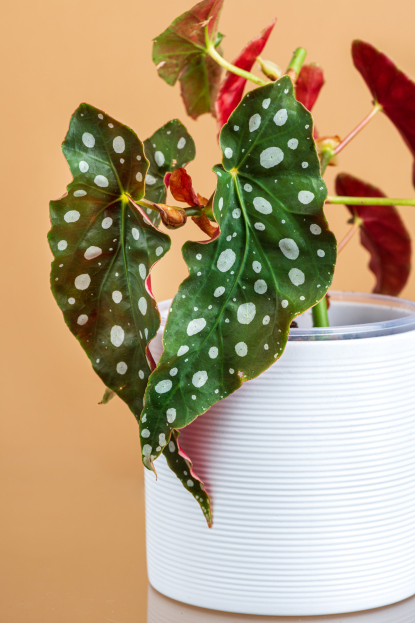
Begonia Maculata thrives in bright, indirect light. It prefers a spot near a window with filtered sunlight, such as an east- or north-facing window. Too much direct sunlight can scorch its leaves, while too little light may cause leggy growth and a loss of its signature polka-dot pattern. If natural light is limited, a grow light can help maintain its vibrant foliage.
Begonia Maculata prefers consistently moist soil but does not like to sit in water. Water when the top inch of soil feels dry to the touch, using room-temperature water to prevent shocking the roots. Avoid overwatering, as excessively moist soil can lead to root rot. Reduce watering during the winter when the plant’s growth slows down. Always ensure excess water drains from the pot after watering.
Begonia Maculata thrives in a well-draining, aerated potting mix. A blend of peat moss, perlite, and potting soil works well, providing the right balance of moisture retention and drainage. Make sure the pot has drainage holes to prevent water from accumulating at the bottom.
This tropical plant prefers temperatures between 65-75°F (18-24°C) and does not tolerate cold drafts. Keep it away from air conditioning vents, open windows in winter, and sudden temperature fluctuations. High humidity (above 50%) is essential for Begonia Maculata to thrive. If your home is dry, increase the humidity by misting the plant, using a humidifier, or placing it on a pebble tray with water.
Feed your Begonia Maculata a balanced liquid houseplant fertilizer diluted to half strength every 2-4 weeks during the growing season (spring and summer). Reduce feeding in the fall & winter when growth naturally slows. Avoid over-fertilizing, as this can cause nutrient buildup and leaf burn.
Regular pruning helps maintain your plant’s shape and encourages bushier growth. Trim back leggy stems and remove any yellow or damaged leaves to keep the plant looking its best. Wiping the leaves with a damp cloth helps remove dust and enhances their ability to photosynthesize.
Begonia Maculata can be easily propagated through stem cuttings. Cut a healthy stem with a few leaves then place it in water or moist soil. If using water, wait until roots develop before transplanting it into the soil. This is a great way to grow more plants or share with friends.
No, Begonia Maculata is toxic to pets if ingested. It contains compounds that can cause irritation, vomiting, and drooling in cats and dogs. Keep this plant out of reach of pets to ensure their safety.